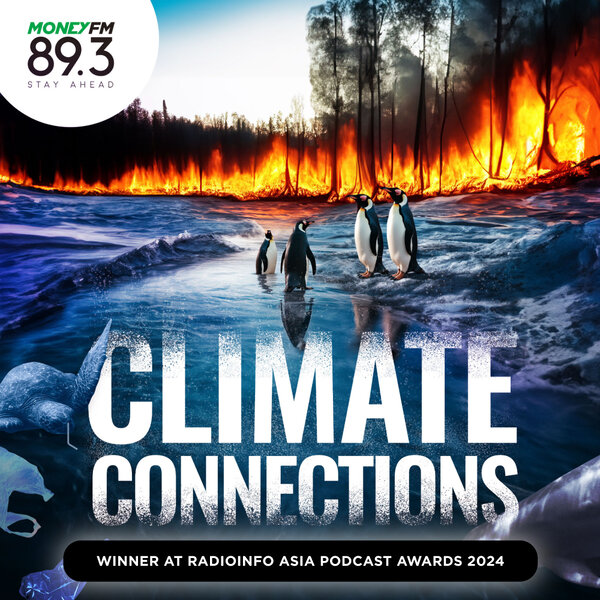
Climate Connections
About
A special segment on Money FM 89.3's Breakfast Show that brings you on an exclusive audio journey to the ends of the world, covering in-depth environment, natural history and climate change stories that intertwine with human life on Earth.
AUG 2, 2024
02/08/24 - Climate Connections: Are lava flows an increasing threat to communities?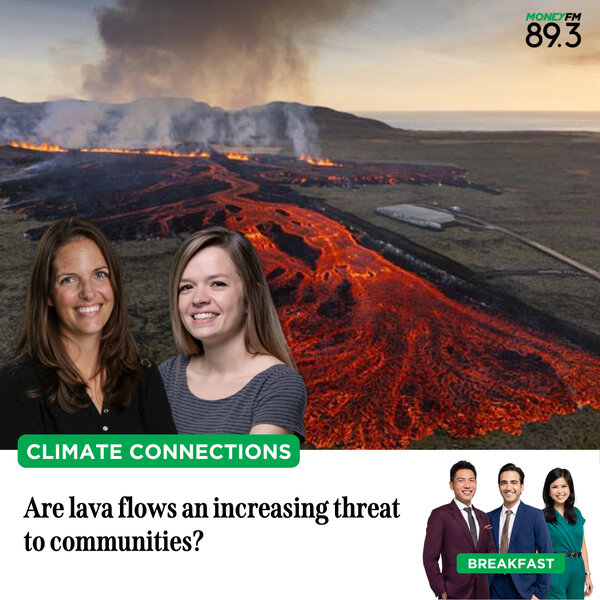
Back in historical times, volcanoes played a crucial role in the evolution of the planet and early life, and are constantly reshaping the morphology of Planet Earth.
Today, about 500 active volcanoes presently exist on the Earth’s surface, with some 50 erupting each year, and more than 800 million people living within 100 kilometres (60 miles) of an active volcano. As populations continue to grow around volcanoes, these impact events will likely continue to affect communities.
With modern society heading into uncharted territory as the world grapples with unprecedented climate change effects, many concepts adopted by policymakers and scientists to deal with volcano-related hazards will quickly become outdated, and hence making ongoing research so crucial.
While extensive research has been done on explosive eruptions, there has been limited studies on how lava flows are impacting communities. These streams of molten rock are one of the most common volcanic hazards and can be disastrous for communities.
On this episode of Climate Connections, Dr Elinor Meredith, Research Fellow in Volcanic Risk, University of Twente and Susanna Jenkins, Associate Professor, Earth Observatory of Singapore, NTU share insights from their extensive study on the frequency and severity of these lava flow impact events, and whether they are an increasing threat to communities.
Feature produced and edited by: Yeo Kai Ting (ykaiting@sph.com.sg)
Voiced by: Audrey Siek
Assistant Producer: Simone Chuah
Photo credits: Iceland Review
Music credits: pixabay & its talented community of contributors
|
|
|
|
12:36
|
JUL 26, 2024
26/07/24 - Climate Connections: An environmentalist's eureka moment & how she sowed the seeds of Singapore's Plant-A-Tree programme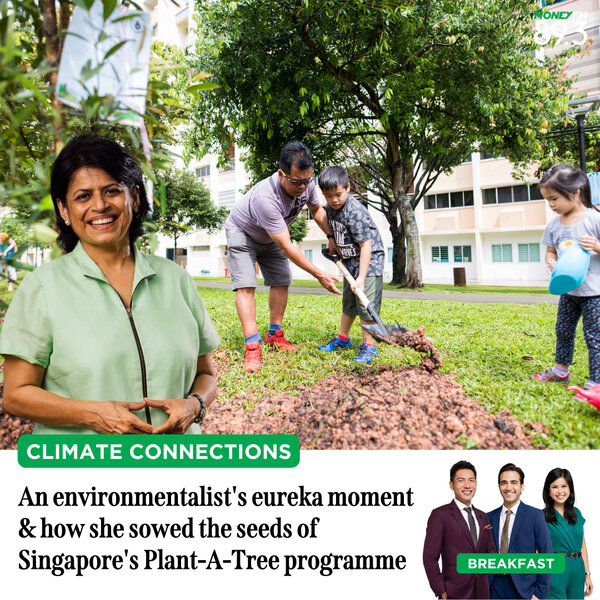
“It's about sowing the right seeds. Seeds which will sprout, which will take root. And so how do we do that? We can't have change overnight, but we need to create a pipeline of the next generation of inventors, thinkers. Though we’re a little dot in this globe, we have that opportunity to nurture them. Many times, I go back to Lee Kuan Yew. He dreamt big. We’ve enjoyed the bounty, how do we take it forward?”
Inspired by Singapore’s Founding Prime Minister Lee Kuan Yew’s love for nature, environmentalist Kirtida Mekani mooted the country’s Plant-A-Tree programme back in the day. It’s an initiative where organisations and individuals can, for a donation of $300, plant a tree in the green spaces managed by the National Parks Board, or NParks.
Fast forward to today, she’s an ardent advocate of biomimicry adoption. With the urgency to tackle climate change growing, she strongly believes that biomimicry is the path forward for science and engineering
On this episode of Climate Connections, Kirtida Mekani, Environmentalist & 2024 Inductee, Singapore Women's Hall of Fame shares insights from her decades-long commitment to environmental causes, and the eureka moment that got her on this green journey.
Feature produced and edited by: Yeo Kai Ting (ykaiting@sph.com.sg)
Voiced by: Audrey Siek
Photo credits: NParks
Music credits: pixabay & its talented community of contributors
Find out more on how to take part in the Plant-A-Tree Programme below: https://www.gardencityfund.gov.sg/our-programmes/plant-a-tree/howtotakepart/
You can also join the OneMillionTrees movement here: https://www.nparks.gov.sg/treessg/one-million-trees-movement/upcoming-activities
|
|
|
|
11:57
|
JUL 19, 2024
19/07/24 - Climate Connections: Propelling Action Through Polar Expeditions. ClimateForce Founder Barney Swan On Walking In The Footsteps Of His Father, Polar Explorer Robert Swan.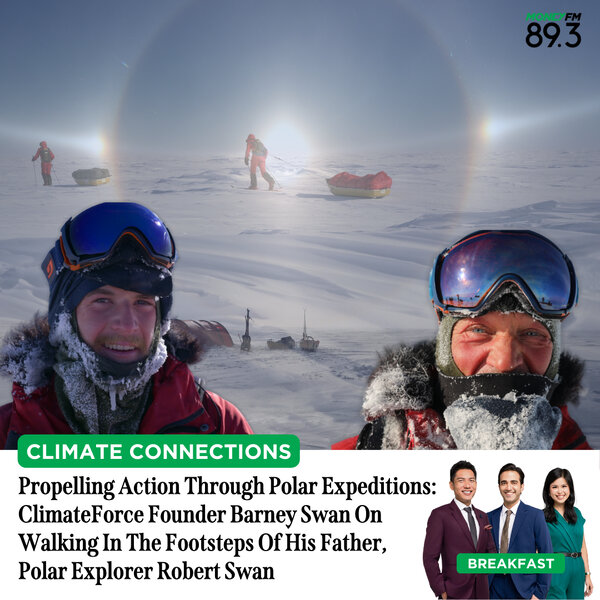
Imagine experiencing climate change effects first-hand right under the hole in the ozone layer.
That's something that most people would not be able to fathom, but celebrated British polar explorer Robert Swan, the first person to have walked to both the North and South Poles unassisted, experienced just that.
On his very first expedition to the South Pole in the 1980s, the prolonged exposure to ultraviolet light during parts of the trip which were directly under that ozone layer hole - permanently altered his eye colour from dark blue to light blue. Some years on, his team nearly drowned at the North Pole due to the premature melting of glaciers in the Arctic. Robert later founded the 2041 Foundation, an initiative dedicated to the preservation of Antarctica.
Fast forward decades later, Robert's son, Barney Swan is following in his father's footsteps. In 2017, Barney became the first person to walk the South Pole powered only by renewable energy.
Today, Barney himself is on a mission to combat climate change through his non-profit, ClimateForce, with a seven-year mission to reduce 360 million tonnes of carbon dioxide (CO2) emissions before 2025.
On this episode of Climate Connections, Barney Swan, CEO of ClimateForce shares his personal insights walking on this green journey with his father.
Robert Swan was a speaker at Ecosperity Week 2024, aimed at being a metaphoric springboard to accelerate climate and nature-positive action, seeking to deepen the collective ownership and commitment needed across all stakeholders, with a focus on radical yet regenerative solutions, to restore the one planet we call home.
Feature produced and edited by: Yeo Kai Ting (ykaiting@sph.com.sg)
Voiced by: Emaad Akhtar
Photo credits: Barney & Robert Swan
Music credits: pixabay & its talented community of contributors
Special thanks to Temasek for making this possible.
|
|
|
|
12:29
|
JUL 12, 2024
12/07/24 - Climate Connections: "I Pick Subjects According To My Conscience." Emmy-award winning filmmaker Richie Mehta crafts an atmospheric tale on illegal ivory trade and why it matters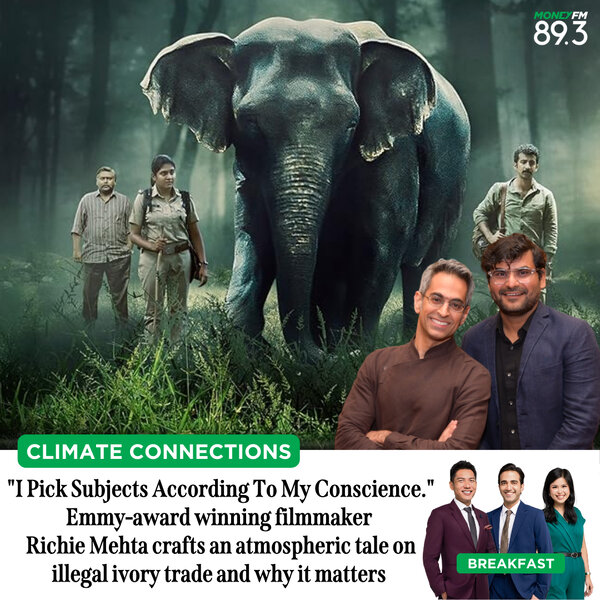
India is currently thought to have around 29,000 wild elephants, especially in the biodiverse Western Ghats region, including Kerala, Karnataka and Tamil Nadu. It’s also the country home to more than half of the global population.
Although poaching, trafficking and trading of elephants and ivory in India is prohibited according to 1972’s Wildlife Protection Act, poaching has remained a constant threat.
Today, around 20-25 elephants are lost to poaching each year.
On this episode of Climate Connections, Emmy-award winning Canadian filmmaker Richie Mehta, who’s the director of Poacher - shares more about his dramatisation of the largest ever elephant poaching case in India.
The eight-episode series was based on the real-life events of Operation Shikar, a sprawling investigation that took place between 2015 and 2017 into elephant poaching in the southern state of Kerala, which led to 72 arrests across India, including elephant poachers, government officials, carvers and high-end ivory art dealers.
Also on this episode, Rohit Singh, Director of Wildlife Enforcement and Zero Poaching, WWF-Singapore , who has first-hand experience coordinating law enforcement activities in India, weighs in on the challenges behind wildlife crime law enforcement.
Feature produced and edited by: Yeo Kai Ting (ykaiting@sph.com.sg)
Voiced by: Audrey Siek
Photo credits: WWF-Singapore / Richie MehtaDrama sound effect credits: Richie Mehta / Amazon Prime
Music credits: pixabay & its talented community of contributors
|
|
|
|
11:48
|
JUL 5, 2024
05/07/24 - Climate Connections: From Doom to Do: The Case for Optimism in Fueling Climate Action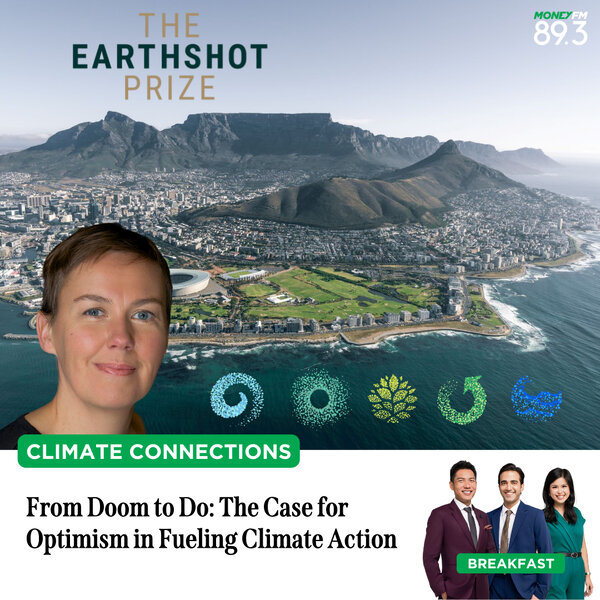
The world is in an era of dire warnings from many scientists and increasing natural disasters, record-breaking temperatures and rising tides. Time is running out to solve the climate crisis, and catastrophe looms.
By now, you're probably used to seeing such headlines. But how can that doom-induced uncertainty be spiralled into meaningful change?
On this episode of Climate Connections, Hannah Jones, CEO, The Earthshot Prize shares her insights on why these messages must be used wisely and how a spark of optimism goes a long way in this fight against climate change. As they continue to support the scale-up of innovations with a potential to repair our planet, she also delves into what she and The Earthshot Prize has been up to as they prepare to hold this year's award ceremony in Cape Town, South Africa.
Feature produced and edited by: Yeo Kai Ting (ykaiting@sph.com.sg)
Voiced by: Audrey Siek
Photo credits: The Earthshot Prize
Music credits: pixabay & its talented community of contributors
|
|
|
|
11:01
|
JUN 28, 2024
28/06/24 - Climate Connections: Is this stool taken? Charting the dung beetle world in Singapore.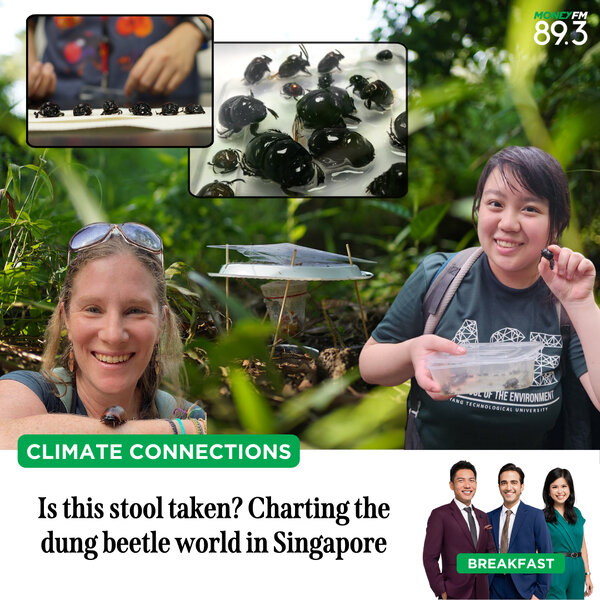
One insect species you probably never knew you needed - dung beetles!
Dung beetles are found worldwide, on every continent except Antarctica. They live in habitats ranging from desert to forest and are classified into three basic groups: rollers, tunnelers, and dwellers. Those words describe how these beetles use the dung they find.
They may seem like unlikely environmental heroes, but these little creatures might just be a weapon in the battle against global warming and other biodiversity issues.
On this episode of Climate Connections, Eleanor Slade, Associate Professor, Asian School of the Environment, NTU, and Zann Teo, PHD Student from NTU, who is currently putting together a species checklist for dung beetles in Singapore, which are understudied to date, especially in the tropics - explain why dung beetles are so important to our wider ecosystem and what they are doing to chart a better future for these beetles.
Feature produced and edited by: Yeo Kai Ting (ykaiting@sph.com.sg)
Voiced by: Audrey Siek
Photo credits: Marx Yim, Tropical Ecology and Entomology Lab / NTU
Music credits: pixabay & its talented community of contributors, Kamaboko Sachiko, Noru
|
|
|
|
13:46
|
JUN 21, 2024
21/06/24 - Climate Connections: Living with lions: Clawing at the human-wildlife conflict up close & personal in Botswana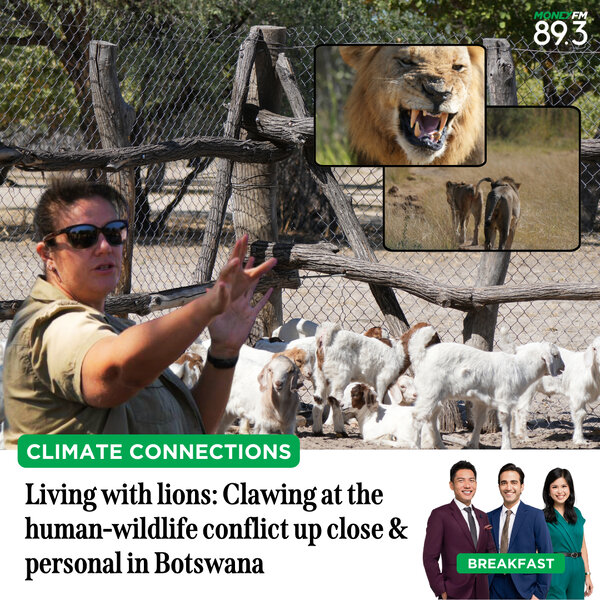
Lions are the apex predators of the African savanna, or what ecologists call - a keystone species.
They play the critical role of managing large herbivore populations of impalas, zebras, buffalos, and even elephants and giraffes. In a balanced ecosystem, the number of herbivores needs to be kept in check because if you have too many herbivores, vegetation will be overgrazed and habitats will inevitably degrade.
As an umbrella species, lions also help maintain a healthy and resilient herbivore population and regulate disease transmissions because they typically hunt and kill those that may be afflicted with parasites, disease or are feeble from a hereditary defect.
Without lions, disease spread is more likely across species, and vast savanna grassland ecosystems would disintegrate into dysfunctional, barren landscapes impacting all other species, including humans.
However, African lion populations are declining - due in large part to habitat loss due to development and human-wildlife conflict. With humans now living closer to predators like lions, having mitigation measures to reduce that conflict is growing in importance as these predators also pose a threat to the local communities and their livestock.
On this episode of Climate Connections, Dr Jess Isden, Coexistence Coordinator, WildCRU - who is working very closely with the local communities through the Trans-Kalahari Predator Programme - shares her insights on how effective human-lion conflict mitigation strategies in Botswana, Africa, can contribute to sustainable development.
Feature produced and edited by: Yeo Kai Ting (ykaiting@sph.com.sg)
Voiced by: Audrey Siek
Photo credits: Yeo Kai Ting
Music credits: pixabay & its talented community of contributors, Hayashi Yu, Makooto
|
|
|
|
17:51
|
JUN 14, 2024
14/06/24 - Climate Connections: Did you know your food waste emits greenhouse gases? One entrepreneur is using solar food dryers to combat that.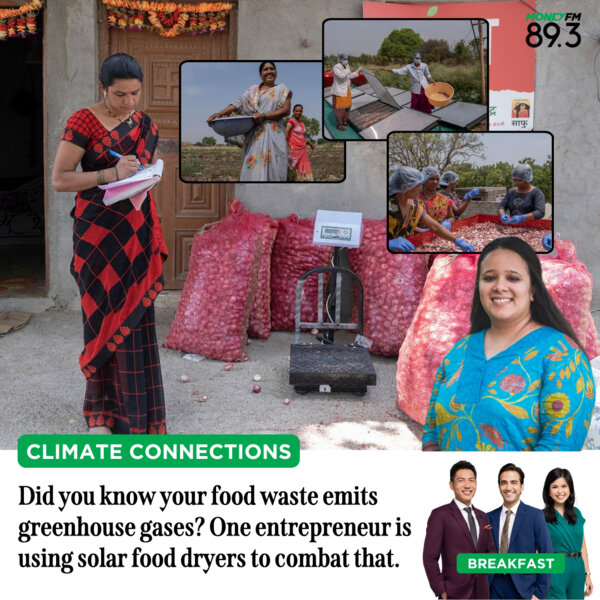
Farmers in India are contending with the impact of climate change every day as their crops are often subject to weather conditions, which are evolving as climate change becomes more deeply entrenched.
Every year, about 30% of agricultural produce is wasted before it leaves the farms. And did you know this food waste contributes to greenhouse gases?
On this episode of Climate Connections, Nidhi Pant, Co-Founder of S4S Technologies, who has seen how deeply intertwined challenges of food waste, rural poverty and gender inequality are, shares the journey she embarked on together with five other university friends, to help smallholder female farmers preserve and market surplus produce.
Feature produced and edited by: Yeo Kai Ting (ykaiting@sph.com.sg)
Voiced by: Emaad Akhtar
Photo credits: The Earthshot Prize
Music credits: pixabay & its talented community of contributors
|
|
|
|
14:22
|
JUN 5, 2024
05/06/24 - Climate Connections: Financing a People-Centered Green Transition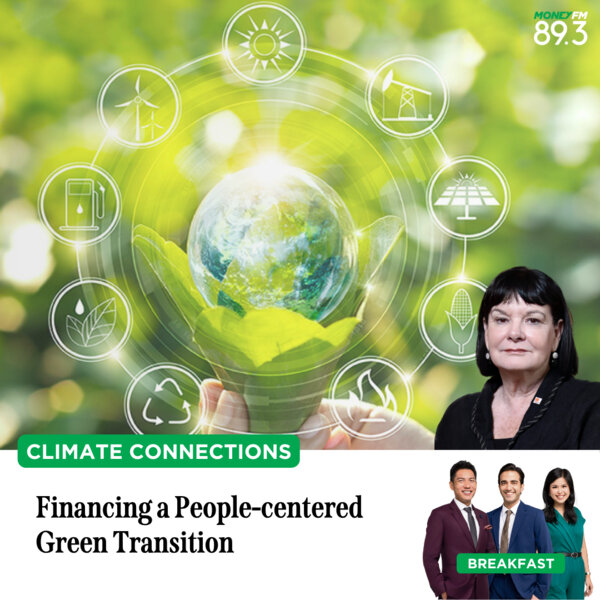
At the COP28 Summit, for the first time since nations began meeting some three decades ago, nearly 200 countries convened by the United Nations approved a milestone plan to ramp up renewable energy and transition away from coal, oil and gas.
With all eyes on the new deal - that is not legally binding and can’t, on its own, force any country to act - “transition finance” is shaping up to be one of this year’s most important topics in the climate space but how just is this transition?
On this episode of Climate Connections, Sharan Burrow, Former General Secretary, International Trade Union Confederation and Global Board of Director, World Resources Institute shares her insights on why a just transition is so important and why people must be at the center of this green transition.
Sharan recently spoke at the 2024 Ecosperity Week spearheaded by Temasek.
Feature produced and edited by: Yeo Kai Ting (ykaiting@sph.com.sg)
Voiced by: Emaad Akhtar
Photo credits: The Coalition of Finance Ministers for Climate Action
Music credits: pixabay & its talented community of contributors
|
|
|
|
10:50
|
MAY 31, 2024
31/05/24 - Climate Connections: Don't put all your eggs in one basket!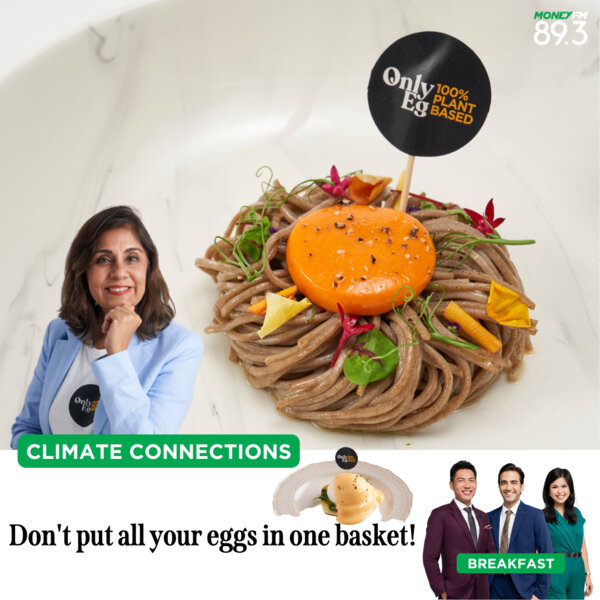
Did you know that in just Singapore alone, an average person can eat nearly 390 eggs in a year?
Every stage of egg production contributes to greenhouse gases and other harmful emissions. Scientists from the University of Oviedo in Spain found that the carbon footprint of eggs is similar to that of other basic foods of animal origin, like milk.
So, is there a way to be more environmentally friendly with our eggs?
On this episode of Climate Connections, Vinita Choolani, Founder and CEO of Float Foods lets us in on why she embarked on that journey to create a plant-based egg that can hopefully substitute our love affair with chicken eggs, and where the business is at right now.
Feature produced and edited by: Yeo Kai Ting (ykaiting@sph.com.sg)
Voiced by: Audrey Siek
Photo credits: Float Foods
Music credits: pixabay & its talented community of contributors
|
|
|
|
12:57
|







